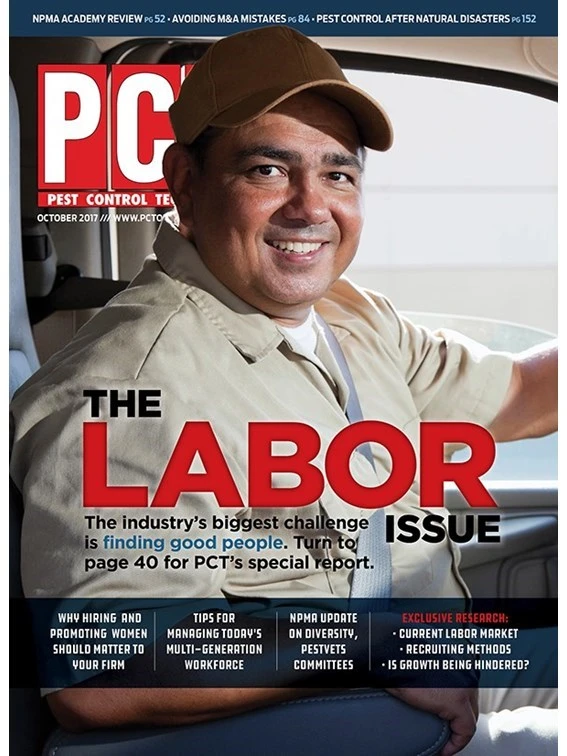Every year, just prior to NPMA PestWorld, the pest control industry’s largest trade show, PCT catches up with the new NPMA president for a Q&A article in which we ask him (or her) a series of questions related to their presidency. (The article appears in the PCT Convention Extra and at www.pctonline.com).
I always enjoy these interviews. They are an opportunity to learn more about each president’s background, present-day issues they are facing and some of their goals as NPMA president. I was especially looking forward to this year’s interview with NPMA President Bryan Cooksey, CEO of Jacksonville, Fla.-based McCall Service. Cooksey, a 1983 graduate of the U.S. Military Academy at West Point, is someone I view as eternally optimistic not only about our country, but the pest control industry. So, I was not surprised at Cooksey’s response when I asked if now was a good time to be a PCO. “It’s never been better!” he said.
Cooksey pointed to bustling M&A activity as a sign of a healthy industry. “The only reason these companies are buying is because they realize pest control businesses have a lot of value,” he said, adding many PCOs are in an enviable position of cashing out or continuing to work in thriving businesses. The greatest challenge, Cooksey said, is finding qualified workers. PCT’s research backs up this claim as well. As reported in an August survey conducted by PCT and third-party firm Readex Research, 46% of PCOs said a lack of quality employees significantly hinders their location’s growth, while 30% said a lack of quality employees modestly hinders their location’s growth. (PCT will have more on this topic in our January 2018 issue, where we have partnered with NPMA for a special report on employee recruitment and retention, sponsored by BASF.)
Fortunately, NPMA is helping PCOs with employee recruitment in several ways, including efforts to cast a wider net for potential employees. The association has created committees to better serve emerging member segments, including the Diversity Committee; PestVests Committee; and Professional Women in Pest Management.
That last segment, women pest management professionals, is one of the subjects of this month’s cover story, “She Can Do It!” As noted in the article, NPMA has been encouraging women to enter the industry through a national campaign focused on educating women about pest control careers. Its messaging reads: “Let’s face it…most little girls don’t imagine themselves growing up to work with insects. Even fewer would imagine themselves working in the professional pest management industry. It’s time for that to change.”
Pest control companies also have become better at targeting specific segments when it comes to recruiting. According to that same PCT/Readex Survey, 33% of respondents have actively recruited veterans; other active recruiting campaigns were for women (25%) and minorities (24%). For example, Bobby Jenkins, owner of ABC Home & Commercial Services, Austin, Texas, said his company is running recruitment advertisements on the same radio stations that carry its customer advertisements (which are largely targeted towards women). At Rollins, the firm is using YouTube videos showing women in the field.
So, while employee recruitment remains an ongoing challenge, I applaud NPMA and some of these progressive pest control companies for their proactive efforts.
* * * * * * * * * * * * * * * * * * *
On the subject of women in pest management, the PCT staff enjoyed the story of Sophia Spencer, an 8-year-old insect enthusiast whose interest in bugs often resulted in her getting bullied by classmates. Her mother, Nicole Spencer, reached out to the Entomological Society of Canada for support. ESA Canada responded by tweeting out A young girl who loves insects is being bullied & needs our support. DM your email & we’ll connect you! #BugsR4Girls. As NPR reported, hundreds of people responded with encouragement. Scores of working entomologists reached out to share their stories. And Sophia joined forces with Morgan Jackson, the entomology Ph.D. candidate who sent out the ESA tweet, to write a paper about the role Twitter can serve in promoting women in science. Who knows, but ESA Canada may be developing a next-generation entomologist.
The author is Internet editor and managing editor of PCT.
Get curated news on YOUR industry.
Enter your email to receive our newsletters.
Explore the October 2017 Issue
Check out more from this issue and find your next story to read.
Latest from Pest Control Technology
- Coalmarch Announces Transition to Private Ownership
- Termatrac Introduces iTraker Pro
- All-American Pest Control Celebrates Employees at Annual Awards Ceremony
- NEPMA PestVets Unit Collects Food and Clothing Items for Veterans
- When Can a Site Be Declared 'Bed Bug-Free?'
- PestWorld East 2025 Program Announced
- Hygiene IQ Uses Smart Sensor Technology to Detect Rodents
- Rollins Acquires Saela Pest Control






